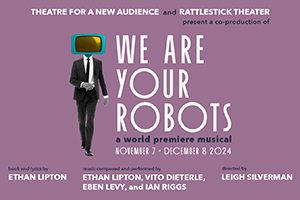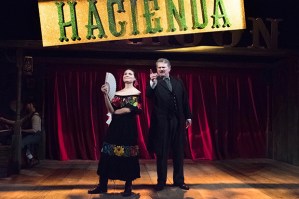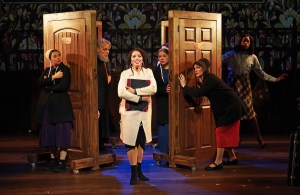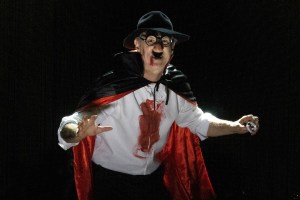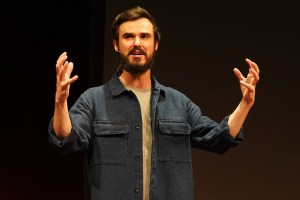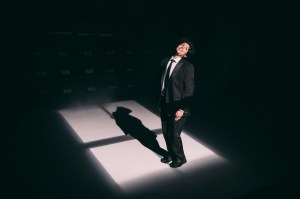Review: The Machines Are Here to Entertain Us in We Are Your Robots
Ethan Lipton and His Orchestra’s new show makes its world premiere at the Polonsky Shakespeare Center.

(© HanJie Chow)
There’s a lot of technology in New York theater these days. Off-Broadway, cellphones are destroying lives in Shit. Meet. Fan. On Broadway, two robots are falling in love in Maybe Happy Ending. Now in Brooklyn at the Polonsky Shakespeare Center there’s an AI-generated band of musicians performing in — is it a musical? a concert? a philosophy lecture with a jazzy score?
Whatever you want to call it, We Are Your Robots is unique — not a surprise coming from playwright and songwriter Ethan Lipton (book and lyrics), who gave us a chorus line of singing cacti in his wacky musical play Tumacho a few years ago.
His current show, a co-production of Theatre for a New Audience and Rattlestick Theater, has Lipton and his three-member orchestra (show composers Vito Dieterle on saxophone, Eben Levy on guitar, and Ian Riggs on bass) playing robots who have come to entertain humans and help them “fulfill their objectives” — whatever those are. (Throughout the show, robot Ethan refers to the others by the bandmembers’ first names.) Over the course of 80 minutes they try to figure out what makes humans tick with an eclectic blend of jazzy, folksy alternative music and existential conjecture.
“Welcome to our demonstration,” says Ethan, giving us a cool, humanoid smile. Suited up like a cross between Talking Heads and Deevo minus the hats (costumes by Alejo Vietti), Ethan and the band sing a boppy opening number, “Robots,” that asks a very broad question: “What do you want?,” and more specifically, what do you want from your machines — the ones that seem poised to take over our jobs and potentially make us obsolete any second now.

(© HanJie Chow)
Some answers might be in our cellphones, which Ethan tells us to leave on during the show so that our information can be “harvested” and our data projected onto a large robot-like face that stands tall at the back of the stage like a drive-in-movie screen (set by Lee Jellinek, projections by Katherine Freer). They aren’t really harvesting our data (so far as I could tell), but I left my phone off anyway.
The alleged audience-sourced words and phrases that pop up on the screen (“The polls are a scam,” “Hell in a handbasket,” “Christmas”) are one of the show’s comedic bits that effectively tap into the zeitgeist without ever really offering any answers. For humans who feel like civilization is teetering on the brink, Ethan and his fellow robots offer a sobering thought: We’re probably doomed.
That’s according to Noam Chomsky, one of several cheery philosophers who make it into Ethan’s sometimes longwinded and dizzying monologues, which are peppered with jokes — several of which involve Reggie Jackson — that land about 80 percent of the time (AI, it seems, hasn’t mastered punchlines).
With gloomy prognostications like Chomsky’s, we’re grateful for lighthearted musical interludes from our animatronic troubadours (and some sax-heavy jamming from Dieterle). “I Am a Machine” sends a jolt of familiarity into the air with its Pulp Fiction-y vibe (I imagined John Travolta and Uma Thurman bots dancing the Twist). Other songs, such as “Everything but You,” seem shoehorned into the show: Would a robot say, “I’m exceedingly unsure about 100 percent of absolutely everything”? Maybe we are doomed.

(© Hollis King)
But then we hear Vito, Eben, and Ian begin the ethereal “Where Are You Now,” a transportive hymn ostensibly translated into English from whale song (Adam Honoré’s undersea lighting establishes the mood). The lyrics make us think there might be hope for humanity if we just check in on each other a little more — maybe the whales, not the robots, know what we really need.
Director Leigh Silverman, who also helmed Tumacho, keeps the show minimalist and straightforward, with the musicians for the most part fixed on individual risers so that our focus stays on Lipton and the large robot face hovering above. One exception is the entrance of Grandpa Morrie, a Roomba-like robot who zips in beeping and booping conversations with Ethan and singing the sweet duet “I’m More Myself” as the band plays. Kudos to sound designer Nevin Steinberg for making Grandpa Morrie’s chirping lyrics sound almost intelligible, but like much of the humor in the show, the bit loses its charge quickly.
If there can be said to be a moment of dramatic crisis in We Are Your Robots, it’s when Grandpa Morrie dies onstage, eliciting an Awww of sympathy from the poor humans in the audience who still have no idea what’s in store for them in an AI-generated world. Fortunately for Grandpa Morrie, a new battery is all that’s needed to restore life. It’s not that simple with humans, so Ethan offers a bit of advice in “Eighty Percent of the Time”: Set your sights a little lower — and that seems like as satisfying an answer as we’re ever going to get. If you go into We Are Your Robots expecting to enjoy 80 percent of it, you’ll be just fine.


